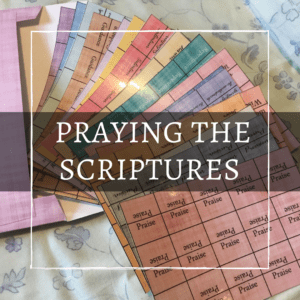UPDATED!
I wrote the bottom portion of this post on niddah back in 2012. Since then, my husband and I have grown in our understanding of niddah, and I want to show you what we have learned. But, I don’t want to delete those original thoughts because they were part of my journey, and I don’t regret them. Our understanding of niddah at that time taught us many valuable lessons, and I wrote about them below.
Our current understanding of niddah
I am thankful that YHVH is always teaching us. When I think that I have everything down and no longer need His correction and instruction, I am in a very dangerous place. I thought I had the niddah laws figured out. But my understanding was limited and focused in the wrong place. I thought the woman was niddah, but in the Hebrew, the flow itself is niddah. The emphasis should be on not coming in contact with the flow. Please take the time to print out and read this article by Steve Siefken. He explained everything quite well, so I will send you to him. My husband and I studied it together and found it very helpful. We have decided to change our approach to niddah as a result.
- We don’t sleep in separate beds, but my husband does sleep in a sleeping bag on the bed. We feel this sufficiently prevents him touching any flow.
- I kiss him goodbye and get a hug when I need it, but there is no intimacy.
- I keep sheets, towels, pads, etc. laundered.
- We do still sit in separate chairs, since those are harder to clean if there is any contamination.
- We are trying to at least rinse off in the shower every day, just in case.
For eight years we took a very conservative approach, and while I don’t regret being more conservative, it is a much harder road emotionally. We made a ritual out of simple sanitary guidelines. As I have said before, please test this out for yourself. I have decided to leave our previous approach at the bottom of this post so that you can study both out. I still feel this is a matter of heart. Are we willing to obey YHVH’s instructions, even if they seem hard or difficult to understand? Are we willing to admit when we are wrong and change how we do things? Are we showing love and meeting each other’s needs? If a command is burdensome to keep, we might need to check how we are obeying, since Torah is not a burden.
Our previous understanding of niddah
I was asked recently why we observe the niddah laws in the way that we do. I hadn’t set out to explain the details, since I assume I don’t know everything, and our observance is less than perfect. But it is a good question, and it was probably inevitable, so I’ll explain our personal understanding of the niddah laws. Please remember that this is our personal understanding, and not a declaration. My hope is that you will test it for yourself. Please don’t attack me or argue about it. Just test it and determine what action you need to take for yourself. We are doing the same.
“When a woman has a discharge, and the discharge in her body is blood, she shall be in her menstrual impurity for seven days, and whoever touches her shall be unclean until the evening. And everything on which she lies during her menstrual impurity shall be unclean. Everything also on which she sits shall be unclean. And whoever touches her bed shall wash his clothes and bathe himself in water and be unclean until the evening. And whoever touches anything on which she sits shall wash his clothes and bathe himself in water and be unclean until the evening. Whether it is the bed or anything on which she sits, when he touches it he shall be unclean until the evening. And if any man lies with her and her menstrual impurity comes upon him, he shall be unclean seven days, and every bed on which he lies shall be unclean.
(Lev 15:19-24)
Niddah matters
I realize we don’t have a temple and we aren’t in the land, but niddah still matters. When a person honestly seeks to observe the niddah laws out of love for YHVH, they are open to many lessons. I have learned many things from observing niddah; including self discipline, patience, a tiny peek at the heart of YHVH, and the value of life. Clean and unclean is not only relevant to the temple, but it teaches us appropriateness. It is also important to practice certain commands so we are prepared to keep them fully in the land. The niddah laws do lose some of their meaning without the temple, but when there is a temple, my heart will be ready to keep them fully because I have been practicing and trying to understand now. YHVH has also been showing me that He wants a people that are willing to turn over every part of their lives to Him. It doesn’t get more personal than the niddah laws, and He’s looking for those that are obeying in this area.
Our niddah observance
When I discover I am niddah, I simply tell my husband, “niddah,” which is our password. Then we set our plan in motion. Yes, we do not touch. We do not sleep in the same bed. We do not sit in the same chair. But why? In the verses above, you will notice that if anyone touches her, he is unclean. So we don’t touch. If anyone lies down where she has, he is unclean. So we don’t sleep in the same bed. If anyone sits in the same chair after her, he is unclean. So I sit in certain chairs and he does not sit in them. I think it goes without saying that there is no intimacy. So why doesn’t he just shower? After all, the verses say that if he touches her, etc. he must wash his clothes and bathe in water and be unclean until evening.
If a man lies with a woman during her menstrual period and uncovers her nakedness, he has made naked her fountain, and she has uncovered the fountain of her blood. Both of them shall be cut off from among their people.
(Lev 20:18)
Do you see the possible discrepancy here?
In chapter 15, if a man lies with a woman during her period, he is unclean for seven days. But in chapter 20, if a man lies with a woman during her period, he is cut off from the people. What makes the difference in punishment here?
We know from other places in Torah that there is a difference between intentional and unintentional sin. I would humbly suggest that we are dealing with intention here. If a couple decides to disregard the niddah laws and do what they please, they will be cut off. If a niddah observant couple are enjoying each other, and uh-oh, they accidentally violate the niddah laws, YHVH provides a solution. With this logic in mind, as we look at the rest of the niddah laws, intention is everything. If we purposely choose to disregard them, taking a shower is not going to fix it. But if we are humbly trying to do our best out of love for our Elohim, if we make a mistake, He provides a solution. (ie Doug might forget I’m niddah and sit on the bed to put his boots on. He asks forgiveness, showers, and moves on.) So we should do our best to follow the niddah laws, but the washing is there just in case something happens accidentally. Doug shouldn’t say, “I’m going to shower anyways, so I’ll touch her.”
Just as a side note, I don’t see opening the same fridge door, etc. as a violation of niddah. It seems to focus on my person directly, and those things that I sit or lie on.
Again, this is our personal understanding of the niddah laws, and how we carry them out. I hope this is useful to someone, but please don’t think we have it all figured out. As soon as we think we’ve got something down, YHVH shows us that we are still clueless, ever dependent on Him. The niddah laws have many layers, but I think willingness to submit, even in such a private area, is very important. In the shaky times we find ourselves in, I want to be searching in all the “closets” of my life, and submitting more to YHVH. I want to be ready when He returns for His bride. ![]()

















13 Responses
Thanks so much for sharing this, it was very helpful. I will definitely be praying about this.
This subject has been heavy on my heart for sometime now, to fully understand what our father wants for us women out of Torah. Your site has helped in so many ways, the greatest is to know we are not alone in following YHVH. On this subject it has driven me to study deeper and deeper. Out of it I now see just how important blood is throughout the scriptures. On this subject I had to go and read it in Hebrew old testament to get definitions word to word and find what the father intended to say in Lev 15, because our english translations today dont always make things clear. I also found a site that shows some of the things I had found. https://answerethamatter.org/biblical_articles/articles/menstruation.htm .. Another question to ask is Matthew 9:20-22. For this miracal our saviour would have been unclean when she touched his tzitzit And he was not. But please continue to study this. Our father is so gracious and loving to show his people his ways. YHVH bless you and your family.
This is definitely a deep subject. My husband and I have continued to study it since I wrote this post. We have grown and changed in our understanding, but we still choose a conservative approach in practice. That’s where we feel comfortable for now. I’m so excited to see people honestly approach the subject and try to practice it in their homes, even if it looks different than at our homes. Thanks for taking the time to comment! Blessings!
I wanted to add, thanks for sharing that link. It has some unique insights, so I printed it to go through with my husband. 🙂
My husband & I agree mostly with the article Amber shared. We believe to practically apply His Torah, we must examine God’s laws with His Holy Spirit. We understand YHVH’s intention is always to preserve & bring forth life. God gave us His “life-giving laws” not to bind us in legalities, but to protect us because He loves us. It is not a burden, but is a light load to carry.
We have been walking out this journey since 2009, and I can attest that our practical applications have changed throughout the years. Where we are now is, other than refraining from “becoming one flesh” and the like, we maintain our daily routines, including showers. 😉 On Friday afternoon before Shabbat begins, our entire family gets showers &/or baths, thus we mikvah.
My husband pointed out something a few years back that made sense to me. He asked me what I touched or sat on that week while going about my errands, and who I thought could have also touched those same things. Besides not recalling every place I had touched, I surely couldn’t tell him who had touched those places before me. And, what about using money, pumping gas, riding public transportation, using the toilet, opening a door, sitting in a chair, buying food, borrowing a library book, etc.? Do you see how that sounds? Impossible to attain, right?! YHVH doesn’t give us rules to follow unless we can follow them simply. The point, in my humble opinion, is to prevent our blood from directly touching others. Blood contains a plethora of contaminants that can spread disease. Blood may also carry generational curses. I have heard of people who feel they have had a sin issue they previously didn’t battle, after a blood transfusion or organ transplant. It is said that “life is in the blood.” Lev. 17:11 The Good News is that we can wash ourselves in the water (literally and spiritually by reading The Scriptures) to become clean once again. And, that Yahshua is our final blood atonement. Halleluyah!
Questions I might ask: Does the Torah address the man’s daughters or maidservants living within his house? What would have happened if multiple females had their blood flows at the same time, or different times? Also, may I add, that could it have also been intended that if a man’s wife was bleeding, that he too was unclean, therefore, he needed to stay home from the synagogue during that time, around once a month? Perhaps set-apart time monthly for the father to exercise his role as priest of His home? Why does the Torah not include the children from being unclean? I know it says anyone who touches her, but what about the babies and children she cares for (the very ones Yahshua says not to forbid from coming to Him), the food she prepares, the laundry she washes, etc? Could it have been Elohim’s intention for her household to stay home that week? How can we practically bring forth life, honor & a generational legacy if the mother is feeling rejection, shame or not wanting to have children because it will keep her away from her family longer? Or, could it have been, that Niddah should have been looked at as a special time after a baby was born to draw close as a family, bond with the baby, with the dad being home to help in many ways, as his wife rested and recovered? If we have not sinned, yet we are condemned to these soul-wounding attributes (Rejection, shame, not wanting to be pregnant), could it be possible, that the restrictions are not from YHVH, but a way for the enemy to come against women? These are questions we must examine with a pure heart bent on YHVH’s character, remembering that He is LOVE, and His definition of what Love is according to 1 Corinthians 13:4-8.
Finally, I want to add this, I still feel Adonai’s presence with me daily when I am having a niddah cycle, so I’m quite certain, He is not putting me on restriction from Himself, from something He created me to do, as some may suggest. No, I see Niddah as a blessing, a promise of hoped for children-to-come, a time of being kind to myself, a time for a nice warm mikvah (bath), a time when my husband & children draw closer & help out more, almost like a set-apart time for mom’s. I consider it the greatest honor in life, to co-labor (pun-intended) with YHVH to create & bring forth life; the life that is in the blood. Hope this blesses you & perhaps gives you another perspective to consider and pray about. Hugs.
Everything you said was very well put. It is definitely a journey we go through in our understanding. We used to follow a very strict niddah observance, and YHVH led us gently over the years to where we are now. So thankful for that!
I have been out of touch with your site for some time (shame on me!). I came here today and found this updated post. Thank you so much for sharing. Understanding Niddah and how to practice and approach it has been a source of frustration for me. My heart long desired to include this in my Torah walk but I did not understand how. The English text does make it seem as if we cannot touch anything and that is impossible when you are taking care of your family! So, thank you, Heidi. I very much appreciate that you share what our Father teaches you with others….and you manage to do so with a brood of 7! I am blessed with 5 myself and I know how busy they keep me. May Yahweh continue to bless you, your family, and your ministry.
I am so glad that post was helpful to you! We did niddah the hard way for years, and I was starting to feel like I was married to my brother lol. YHVH shows us His ways, and I am so thankful!
We have reached a huge block in our practice of niddah. While we observe it differently than you, you seem to be the only one willing to talk about it and so I seek your insight. Leviticus 15 (25-28) talks about a discharge, like her menstrual cycle, but lasting longer than a regular cycle. When that happens, she is supposed to count off an extra 7 days, then she is “clean”. Here’s our struggle. In my premenopausal state, I can bleed for about 14 days, not heavy flow, but maybe consistent spotting, then to count off 7 more days leaves very little time for intimacy. I’m not the physical touch one, but even I miss time with my love. Do we have all of this mixed up? I’ve tried researching this, but commentaries say that this is legalistic and no longer valid, but I disagree. When I read this post, I prayed some more. I am perplexed. I want to serve the Almighty and walk in His commands, but I want to love on my hubby too.
I want to start by saying that I have so been there. I have had bleeding during almost all of my pregnancies. I considered these unusual bleeding and had to count seven days. At that time, we did not even touch during times of niddah. I would count to about clean day five and start bleeding again. I went 28 days in a row. I cried and cried. Now that I understand touching is allowed, but keeping the flow separate and properly tended to, it would be much easier, but still hard. I do believe you are counting correctly according to the verses. I also feel this command most often serves as protection, since longer bleeding could be an indication of something wrong. My advice would be to first make sure you are supporting your health, so your body can do what it needs to do. I’ve talked to my mom and mil about menopause. It can be a very difficult and unpredictable time, but it does come to an end, and then no more niddah! 🙂 In the meantime, do your best to build intimacy with your husband in other ways. I don’t believe anymore that niddah means no touch. That leaves you a lot of options. Talk more, hold hands, give and receive hugs. Perhaps YHVH means this to be a time where the two of you draw closer together in other ways. My husband has an inconvenient schedule, and I understand the feeling that there’s not much time for intimacy. Keep praying. Keep loving your husband, and this too shall pass. That would be my advice to you, but please continue to pray and seek how to best serve YHVH during this time. He knows best, and I know He will shine a light for you and your husband. Many blessings to you, Heidi
Dear Heidi, I’m so glad that I found your post! I just googled practical Niddah, and there it was! We’re a Torah observant family for many years now, but we never did the niddah thing… In the beginning of the year(February) Father just confronted me with the question – “Who’s law is it?” as I was opening my closet door. I knew that I was ready. I spoke with my husband and he immediately agreed that it was time. But we don’t know the practicality of it. We didn’t need to do the different bed thing the first two months, as he was away (a very rare occurrence) then we had one month of “separate beds” and then this month we only did separate bedding…. It was good to read your advice and insight, knowing that you’ve been through all of this. Thank you so much for sharing. I do have a few questions and I’m wondering if you can answer them?…. do you hug other (fellowship members) when you’re niddah? Do you let others than your husband know when you’re niddah? Would love to hear from you,
Serving YHVH,
Thanks for your comment, Wilma! As to your questions, I used to feel very awkward hugging other people when I was niddah, but I couldn’t seem to stop people like my dad. Now, I don’t worry about it. A quick hug isn’t putting them in contact with anything they shouldn’t be. 😉 My family knows when I’m niddah, it seems unavoidable when we are always around each other. The kids have a good working knowledge of how the body works, so it’s no big deal to them. Outside the family, no one knows. I don’t think they need to. If I was near a Levitical priest on the way to serve in the temple, probably different. But until then, I don’t worry about it like I used to. Hope that helps!
Good to know I am not alone!
This has gotten complicated, though, since we had children. Toddlers don’t understand changing rules of “sit here, but not there, but next week it’s okay to sit anywhere.” Now there are three touching every bit of furniture every day. Cross contamination is inevitable, and Husband just doesn’t worry about where he sits, anymore. When the time is up, we bathe everyone and clean all the beds and chairs, and then it’s two days of catch-up laundry to clean up the aftermath. Anyone else having this experience or have some ideas for streamlining? I still sense YHWH’s blessing when we work to obey His word regarding blood and emissions, so there is no desire to quit.